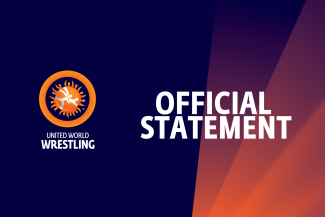Gadzhiev Stops Russia from Putting 5 Out of 5 in Finals at #WrestleSkopje
Monday, May 17, 2021 - 15:41 By Vinay Siwach

Russia had entered five wrestlers in the semifinals of the five weight classes that were in action on Monday in Skopje. But the hopes of sending all five of them in Tuesday's finals were dashed as Dzhabrail GADZHIEV (AZE) defeated Inalbek SHERIEV (RUS) in the semifinal at the 70kg weight class.
Such was their dominance on the first day of the U23 European Championships in Skopje, North Macedonia the four others which reached the final defeated their opponents either via technical superiority or via fall at the Jane Sandanski Arena.
A former cadet world champion in 2019, Gadzhiev pulled all tricks out of the bag as he hung on for 7-6 win despite being cautioned twice in the bout.
In contrast to Sheriev's showing, Russia's quartet of Akhmed IDRISOV, Abdulmazhid KUDIEV, Khalid IAKHIEV and Aslanbek SOTIEV reached the final at 57kg, 65kg, 79kg and 97kg respectively in dominant fashion.
The finals line-up for Tuesday was completed by Aliabbas RZAZADE (AZE) at 57kg, Erik ARUSHANIAN (UKR) at 65kg, Nicolai GRAHMEZ (MDA) at 70kg, Ramazan SARI (TUR) at 79kg and Radu LEFTER (MDA) at 97kg.
In a bout that saw two cadet world medalists collide, Sheriev opened the scoring with a step out and Gadzhiev leveled it 1-1 after getting a step out of his own. But the big move came when Gadzhiev completed a takedown and continued the action for two turns to lead 7-2.
Then the waiting game began. Sheriev pulled off a slip from Gadzhiev's locks and scored a takedown to make it 7-4 before a warning to the Azerbaijan wrestler gave another point to him.
As Gadzhiev waited for the clock to expire, he was again warned for a singlet pull which reduced his lead to merely a point but he did well to hang on to it for 7-6 win.
Giorgi ELBAKIDZE (GEO) was Gadzhiev's first victim as he lost the 1/8 final 4-2 before the latter humbled Tobias PORTMANN (SUI) 9-2 in the quarterfinal.
Russia's field day
But the top performances came in the 57kg weight category as Idrisov ran through the 57kg field. He did not show any mercy to former junior world silver medalist Ramaz TURMANIDZE (GEO) in a 13-2 victory. The semifinal against senior European Championships bronze medalist Kamil KERYMOV (UKR) was as similar story as he won 10-0 to set up a final against Rzazade, who was equally dominant.
After getting a victory by default in the qualification round, he scored a 12-2 win over Hafiz Can HASDEMIR (TUR) and scored three four-point throws against Simone PIRODDU (ITA) in semifinal to win 14-1 in the first period.
The 65kg final will see former junior world champ at 70kg Arushanian take on Kudiev. While Kudiev was sitting in the quarterfinal and had an easier passage to the final, Arushanian was tested by junior European champion Hrachya MARGARYAN (ARM).
With less than 10 seconds left in the quarterfinal, Arushanian was trailing 4-4 on criteria but got a leg lace and a 6-4 win. Marwane YEZZA (FRA), who seemed to have hurt himself in the semifinal, surrendered against the Ukrainian.
At 79kg, Iakhiev had a to and fro bout against Valentyn BABII (UKR) but managed to get a cradle to pin the Ukrainian. The bout began with Iakhiev exposing Babii on his back to lead 2-0. But Babii got a front headlock for four before Iakhiev's reversal and roll. Babii still led 5-5. He had the Russian on his back but failed to get the pin, going into the break with 7-5 lead.
Iakhiev seemed much aggressive in the second period and began with a takedown before an exposure gave him a 9-7 lead. He managed to get a cradle over Babii and froze him in that position to get the fall with two minutes and six seconds remaining.
He will take on Ramazan SARI (TUR) in the final as he defeated Goga MAMIAURI (GEO) 3-0. No points were scored by action as Sari got a step out before Mamiauri was warned twice.
Joining his Russian teammates in the final is Sotiev. The 97kg wrestler showed extreme composure to win 14-4 against Luka KHUTCHUA (GEO) despite trailing 0-4 at the break. With Khutchua struggling with his cardio in the second period, Sotiev scored a takedown and an exposure in first action.
Seconds later, he managed a perfect leg-lace to finish the bout and set up a final against Lefter who defeated Aliaksei PARKHOMENKA (BLR) 14-7.
Grahmez was the other Moldovian to reach the final as he defeated Arman ANDREASYAN (ARM) 4-3 in the 70kg semifinal. All but one points were scored as a result of step outs.
Freestyle action will continue on Tuesday with 61kg, 74kg, 86kg, 92kg and 125kg wrestler in action in Skopje.
Results: Freestyle
57kg
GOLD: Akhmed IDRISOV (RUS) vs Aliabbas RZAZADE (AZE)
SF 1: Akhmed IDRISOV (RUS) df Kamil KERYMOV (UKR), 10-0
SF 2: Aliabbas RZAZADE (AZE) df Simone PIRODDU (ITA), 14-1
65kg
GOLD: Abdulmazhid KUDIEV (RUS) vs Erik ARUSHANIAN (UKR)
SF 1: Abdulmazhid KUDIEV (RUS) df Uladzislau KOIKA (BLR), 13-0
SF 2: Erik ARUSHANIAN (UKR) df Marwane YEZZA (FRA), via fall
70kg
GOLD: Dzhabrail GADZHIEV (AZE) vs Nicolai GRAHMEZ (MDA)
SF 1: Dzhabrail GADZHIEV (AZE) df Inalbek SHERIEV (RUS), 7-6
SF 2: Nicolai GRAHMEZ (MDA) df Arman ANDREASYAN (ARM), 4-3
79kg
GOLD: Ramazan SARI (TUR) vs Khalid IAKHIEV (RUS)
SF 1: Ramazan SARI (TUR) df Goga MAMIAURI (GEO), 3-0
SF 2: Khalid IAKHIEV (RUS) df Valentyn BABII (UKR), via fall (11-7)
97kg
GOLD: Radu LEFTER (MDA) vs Aslanbek SOTIEV (RUS)
SF 1: Radu LEFTER (MDA) df Aliaksei PARKHOMENKA (BLR), 14-7
SF 2: Aslanbek SOTIEV (RUS) df Luka KHUTCHUA (GEO), 14-4



Share your thoughts.
Comments